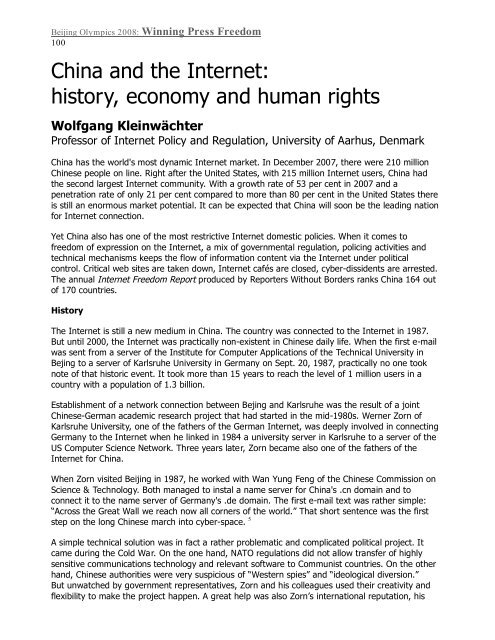Beijing Olympics 2008: Winning Press Freedom - World Press ...
Beijing Olympics 2008: Winning Press Freedom - World Press ...
Beijing Olympics 2008: Winning Press Freedom - World Press ...
You also want an ePaper? Increase the reach of your titles
YUMPU automatically turns print PDFs into web optimized ePapers that Google loves.
<strong>Beijing</strong> <strong>Olympics</strong> <strong>2008</strong>: <strong>Winning</strong> <strong>Press</strong> <strong>Freedom</strong><br />
100<br />
China and the Internet:<br />
history, economy and human rights<br />
Wolfgang Kleinwächter<br />
Professor of Internet Policy and Regulation, University of Aarhus, Denmark<br />
China has the world's most dynamic Internet market. In December 2007, there were 210 million<br />
Chinese people on line. Right after the United States, with 215 million Internet users, China had<br />
the second largest Internet community. With a growth rate of 53 per cent in 2007 and a<br />
penetration rate of only 21 per cent compared to more than 80 per cent in the United States there<br />
is still an enormous market potential. It can be expected that China will soon be the leading nation<br />
for Internet connection.<br />
Yet China also has one of the most restrictive Internet domestic policies. When it comes to<br />
freedom of expression on the Internet, a mix of governmental regulation, policing activities and<br />
technical mechanisms keeps the flow of information content via the Internet under political<br />
control. Critical web sites are taken down, Internet cafés are closed, cyber-dissidents are arrested.<br />
The annual Internet <strong>Freedom</strong> Report produced by Reporters Without Borders ranks China 164 out<br />
of 170 countries.<br />
History<br />
The Internet is still a new medium in China. The country was connected to the Internet in 1987.<br />
But until 2000, the Internet was practically non-existent in Chinese daily life. When the first e-mail<br />
was sent from a server of the Institute for Computer Applications of the Technical University in<br />
Bejing to a server of Karlsruhe University in Germany on Sept. 20, 1987, practically no one took<br />
note of that historic event. It took more than 15 years to reach the level of 1 million users in a<br />
country with a population of 1.3 billion.<br />
Establishment of a network connection between Bejing and Karlsruhe was the result of a joint<br />
Chinese-German academic research project that had started in the mid-1980s. Werner Zorn of<br />
Karlsruhe University, one of the fathers of the German Internet, was deeply involved in connecting<br />
Germany to the Internet when he linked in 1984 a university server in Karlsruhe to a server of the<br />
US Computer Science Network. Three years later, Zorn became also one of the fathers of the<br />
Internet for China.<br />
When Zorn visited <strong>Beijing</strong> in 1987, he worked with Wan Yung Feng of the Chinese Commission on<br />
Science & Technology. Both managed to instal a name server for China's .cn domain and to<br />
connect it to the name server of Germany's .de domain. The first e-mail text was rather simple:<br />
“Across the Great Wall we reach now all corners of the world.” That short sentence was the first<br />
step on the long Chinese march into cyber-space. 5<br />
A simple technical solution was in fact a rather problematic and complicated political project. It<br />
came during the Cold War. On the one hand, NATO regulations did not allow transfer of highly<br />
sensitive communications technology and relevant software to Communist countries. On the other<br />
hand, Chinese authorities were very suspicious of “Western spies” and “ideological diversion.”<br />
But unwatched by government representatives, Zorn and his colleagues used their creativity and<br />
flexibility to make the project happen. A great help was also Zorn’s international reputation, his





